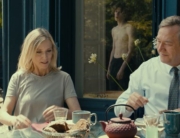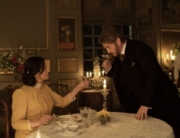Say bonjour to Judith, who is beautiful and confident as only a well-born French woman can be. On top of that, she’s advantageously married to a star orchestra conductor. Except no: This beautiful and confident woman is actually Swiss and happens to be deep in a relationship with a sexy, possibly younger man. Confused? Well, so is she, and so are the men in her orbit. Antoine Barraud’s Madeleine Collins raises Hitchcockian thrills trailing a woman caught in a consuming deception most women wouldn’t even dare to try—a double life. This elegant-looking movie deploys a high-value asset in star Virginie Efira. Handling meaty roles with aplomb in prestigious and varied films like Benedetta and Other People’s Children, Efira is one of the best actresses working in films today. Her ability to make a dissembling, mysterious central figure relatable keeps us watching as Judith slides deeper into mental distress.The film starts off with an unsettling scene of a woman fainting in a swanky dressing room, executed in a masterful and voguish long take. Salesladies tut-tut and try to act concerned while at the same time feigning that nothing is amiss. There’s a tacit cover-up in progress, one that will set a tone for the movie. Later, we glimpse radiant Efira in a cushy domestic scenario that establishes her as Judith, the loving wife of classical music star husband (Bruno Salomone) in Paris. Anxiety surfaces again as Judith rushes out of his high-profile concert; she’s having a dizzy spell. We understand why she feels stressed: She keeps an alternate house in Switzerland with moody and volatile Abdel (Quim Gutiérrez). Children with both of these men preoccupy Judith, who is maternal and as loving as she can be given her divided attention. A less nurturing figure, Judith’s sniping, competitive mother (Jacqueline Bisset) floats at the periphery.
Judith’s façade begins first to crack, then to buckle as Barraud ratchets up the tension. Judith gives a false name to someone who turns up at the wrong time. Her lovers (one of whom knows more than the other) challenge holes in her narratives. More crucially, so does her teenage son in France. Lies and desperation mount. When the whole charade explodes in borderline melodramatic fashion, we’re more than ready, although the ingenious explanation why may not satisfy all viewers. Although Madeleine Collins is on its face a psychological thriller, on another level it may function as a feminist critique. It reflects a hypercharged version of women’s lives spent fulfilling the needs of partners, children, and employers, each of whom demands a separate identity. The task is exhausting. Judith is warm, charming, in demand socially, maternally and sexually, but all to her ultimate cost. Everyone wants her on their side, and everyone thinks they know her, except no one really does. And wanting to satisfy everyone, she satisfies no one, least of all herself. The pressure-cooker film can feel like a warning against becoming too consumed in domestic life and relationships, let alone two sets of them.







Leave A Comment